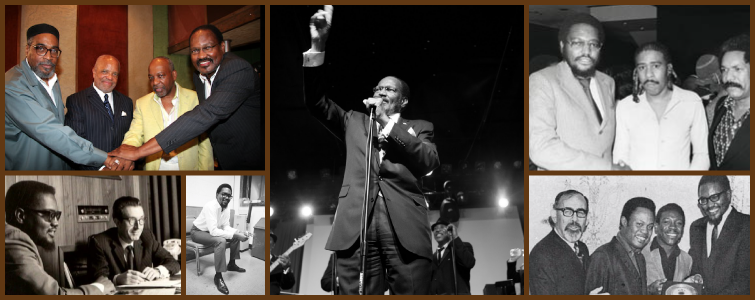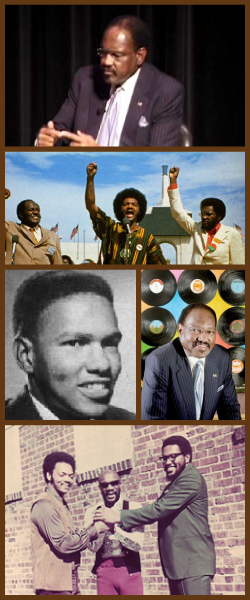Bell and his family moved from Brinkley, Ark., to 1200 East Broadway Street in North Little Rock where he attended St. Augustine Catholic School his first four years of school. It was at St. Augustine where Bell credits learning how to be an entrepreneur. He was exposed to business – selling clothes to raise money to help families of children who attended the school but could not afford to pay the tuition. “I captured the spirit of entrepreneurship.”
Bell’s last four years of school were at Scipio A. Jones High School – a segregated high school for Blacks. While there, Bell was president of the State of Arkansas National Honor Society, second tenor in the glee club, salutatorian, and he was charged with managing the motion picture and audio visual aid club.
 As a result of his positive and upbeat personality and natural ease with nearly everyone, he organized a talent show between Dunbar High School in Little Rock and Scipio A. Jones High School in North Little Rock with Little Rock radio station KOKY disc jockeys serving as judges. Getting the attention of the radio station manager for his “uncanny gift of gab” Bell was offered a disc jockey job while a senior in high school.
As a result of his positive and upbeat personality and natural ease with nearly everyone, he organized a talent show between Dunbar High School in Little Rock and Scipio A. Jones High School in North Little Rock with Little Rock radio station KOKY disc jockeys serving as judges. Getting the attention of the radio station manager for his “uncanny gift of gab” Bell was offered a disc jockey job while a senior in high school.He soon became the No. 1 disc jockey in the region. Music and record promoters from Memphis, St. Louis, Atlanta and other urban cities converged on Little Rock to bring Bell their artists’ records to play. From spinning sounds as a disc jockey to organizing discos and sock hops at night, Bell gained a reputation as the number one radio personality in the region and created his own financial freedom. He went from being a disc jockey earning a little more than $9.00 a week to earning $400 a week as an event organizer and promoter while a student at Philander Smith College.
 To gain a better understanding of music and the music business, he studied music, musical arrangements and why people related to music. He visited record shops and talked with retailers, wholesalers and learned the business of wholesale distribution.
To gain a better understanding of music and the music business, he studied music, musical arrangements and why people related to music. He visited record shops and talked with retailers, wholesalers and learned the business of wholesale distribution.Bell initially majored in pre-med but eventually chose a major in political science and minored in philosophy and religion with an emphasis on the life and teachings of Jesus. Bell was encouraged by one of his former high school instructors to join the Southern Christian Leadership Conference (SCLC) Workshops in Midway Georgia. He served as a student teacher at the SCLC.
Shortly thereafter, he was recruited to work at WLOK Radio Station in Memphis, where he met his wife of nearly 50 years. From WLOK, he moved to WUST Radio Station in Washington, D.C.
In 1965, Bell returned to Memphis to join Stax Records as director of promotions, and was the force that led to the company’s profitability growth. He quickly rose through the ranks of the company, eventually becoming executive vice president of Stax, and the most influential figure in the company after its co-founder. Bell became co-owner of Stax in 1969 and was the first African-American to have equity in the label. He was vital to the careers of Stax’s soul stars such as The Staples Singers and Isaac Hayes, The Emotions, The Dramatics, and Mel and Tim. His promotional efforts drove the “Memphis Sound” internationally, and made Stax the second-largest African American-owned business in the 1970s.
In addition to his operations and promotional work, he was often directly involved in the production of the label’s music, working as a songwriter and a producer for several acts on the label. Under Bell’s leadership, Stax began distributing music from several smaller Memphis labels and produced and released the soundtracks for feature films such as Sweet Sweetback’s Baadasssss Song and Shaft (both 1971).
In 1972, Al Bell organized and financed Wattstax: The Living Word, a day-long concert featuring Stax artists which was held in Los Angeles to uplift and heal the community where the Watts Rebellion took place. A 1973 Wattstax documentary film was produced by the label’s new film division.
After four years of the label distributing its own records, Bell signed a new distribution deal with CBS Records in 1972.
In the 1980s, Bell became head of the Motown Records Group and worked closely with Berry Gordy, Jr. in the sale of Motown to the MCA/Boston Ventures Group. After Motown, he discovered the music group Tag Team and through his Bellmark Records label released their hit single, “Whoomp! (There It Is),” which became one of the fastest selling singles in the music industry history. Bell also released Prince’s hit single, “The Most Beautiful Girl in the World”, after Prince’s label, Warner Bros. Records turned him down.
Upon his return to Memphis to help develop the city’s independent music scene, Bell was profiled in the New York Times and described by the BBC as “one of the icons of soul music” and “the driving force behind Stax Records.” In 2011, he joined musical and entertainment icons, including the Beatles, Walt Disney, George and Ira Gershwin, Berry Gordy, Duke Ellington and others, when he received the highest honor bestowed by the National Academy of Recording Arts and Sciences (NARAS) and the Grammy Foundation, the Grammy Trustee Lifetime Achievement Award.
“This is your 6 feet 4 bundle of Joy, 212 pounds of Mrs. Bell’s Baby Boy; Soft as medicated cotton; Tender as a mother’s love; Rich as double X cream; The women’s pet; The men’s threat; The playboy’s pride and joy - The Baby Boy, - Al Bell!”

Bell is the recipient of numerous awards and honors including:
- Arthur A. Fletcher Lifetime Achievement Award National Black Chamber of Commerce
- Alex Haley “Roots Award” Greater Washington, DC Business Center
- National Award of Achievement U.S. Department of Commerce
- Dare To Soar Award, Mosaic Templars Cultural Center
- Achievement Award, Boy Scouts of America
- 1000 Most Successful Blacks, Ebony Magazine
- 100 Most Influential Black Men, Ebony Magazine
- Entered in “Who’s Who in the World”
- America’s Music and Entertainment of Fame Inductee
- Arkansas Black Hall of Fame Inductee
- Member of the Board of Directors Memphis Chamber of Commerce
- Member of the Board of Directors Central Arkansas Chapter of the March of Dimes
- Member of the Board of Trustees, Philander Smith College
- Memphis’ Legendary Record Producers Award
- W.C. Handy Lifetime Achievement Award
- Record Executive of the Year, Impact Magazine
- Record Executive of the Year, BRE
- Chairman’s Award, Southeast Music
- NARM Indie Best Seller Award (“Whoomp!There It Is” – Tag Team)
- Independent Label of the Year Award, The Urban Network
- The Spirit of Freedom Award, Freedom Magazine
- Russell Simmons Award for Executive
- Excellence, Young Black Programmers’ Coalition
- Black Music Chief Executive of the Year
- Living Legend Award, Warner Bros. Reprise Records & Urban Network
- Heroes and Legends Leadership Award
- Voted All-Time Greatest Executives in Black Music Impact Magazine Poll
- Best Documentary (Wattstax), Golden Globe nomination
- Executive of the Year, Bill Gavin Radio Program Conference
- Memphis Music Foundation Chairman
- 2007 Honorary Doctorate in Music Philander Smith College
- 2011 Honorary Doctorate in Arts Humanities Philander Smith College
- 2011 Grammy Trustees Award Recipient


